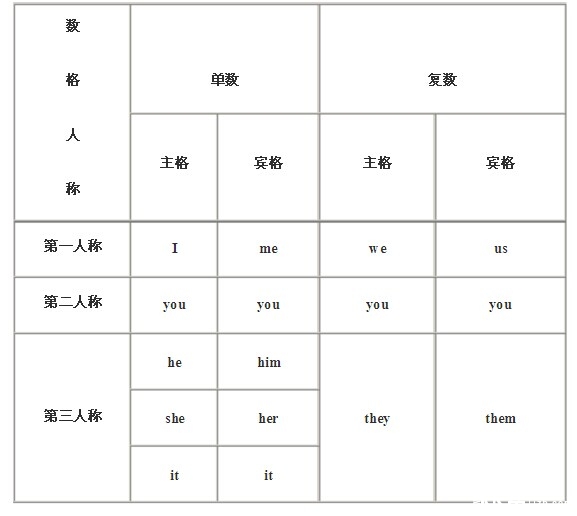
英語人稱代詞
相關詞條
- 英語人稱代詞
英語中人稱代詞(Personal Pronoun)意為用於指代人的辭彙,屬於代詞範疇,就像漢語中的“你”、“我”、“他”。常用的英語人稱代詞有:I、you、he、she、it(主格)...
- 人稱代詞
人稱代詞是指直接指代人或者事物的代詞。在英語和漢語中都有三種人稱代詞即:第一人稱(我;我們),第二人稱(你;你們),第三人稱(他、她、它;他們、她們、它們)...
- 代詞(英語單詞詞性)
代詞是代替名詞或一句話的一種詞類。大多數代詞具有名詞和形容詞的功能。英語中的代詞,按其意義、特徵及在句中的作用分為:人稱代詞、物主代詞、指示代詞、反身...
- 英語物主代詞
漢語通常只說“搖頭”,不說“搖某人的頭”,而英語則說 shake one’s head。2. 有時按漢語習慣似乎套用物主代詞,而英語卻要用人稱代詞:...
- 賓格(英語中的一種語法)
賓格(accusative case;objective case;casus accusativus)表示一個動詞直接賓語的名詞或一個前置詞的賓語。人稱代詞里的:主格放在句首做主語和表語,賓格放在句末或句...
- 人稱
代詞所指的是說話的人叫第一人稱,如“我、我們”;所指的聽話的人叫做第二人稱...1 漢語人稱 2 英語人稱 人稱漢語人稱 編輯 第一人稱:我、我們。第二人稱:你...
- 英語代詞
《英語代詞》是2010年吉林出版集團有限責任公司出版的圖書,譯者是綦戰朝。本書介紹了以解決學生學習中的實際問題為宗旨,討論問題力求全面,敘述例證力求簡明。...
- 人稱代詞語篇回指研究
《人稱代詞語篇回指研究》是宋宏編著的一本圖書。...... 《人稱代詞語篇回指研究》專題研究了英語新聞語篇中第三人稱代詞語篇回指的輸入和輸出問題。全書基於語料...
- 英語史
第八章 美國英語附錄一 印歐語系各語言附錄二 古英語名詞附錄三 古英語代詞附錄四 古英語形容詞附錄五 古英語動詞附錄六 中古英語第三人稱代詞分布圖...
- 中古英語
1 語法 2 人稱代詞 3 辭彙 4 日常生活用語 中古英語語法 編輯 中古英語的語法在形態變化方面發生了簡化。名詞逐漸失去了古英語複雜的數和格的變化,簡化成了...
- 代詞(英語代詞)
英語中的代詞,按其意義、特徵及在句中的作用分為:人稱代詞、物主代詞、指示代詞、反身代詞、相互代詞、疑問代詞、關係代詞、連線代詞和不定代詞九種。...
- 代詞(中文代詞)
代詞,即代替名詞、動詞、形容詞、數量詞、副詞的詞。可分為三類: 人稱代詞, 疑問代詞,指示代詞。...
- 物主代詞
表示所有關係的代詞叫做物主代詞(Possessive Pronouns),也叫人稱代詞的所有格。物主代詞分為形容詞性物主代詞和名詞性物主代詞兩種。物主代詞有人稱和數的變化。第...
- 周領順
30. 從英語人稱代詞的使用看譯者對原文風格的能動把握,《中國翻譯》2004,4.31. 美國中餐館菜譜英譯評價原則——從譯者身份的角度談起,《中國翻譯》,2013,5....
